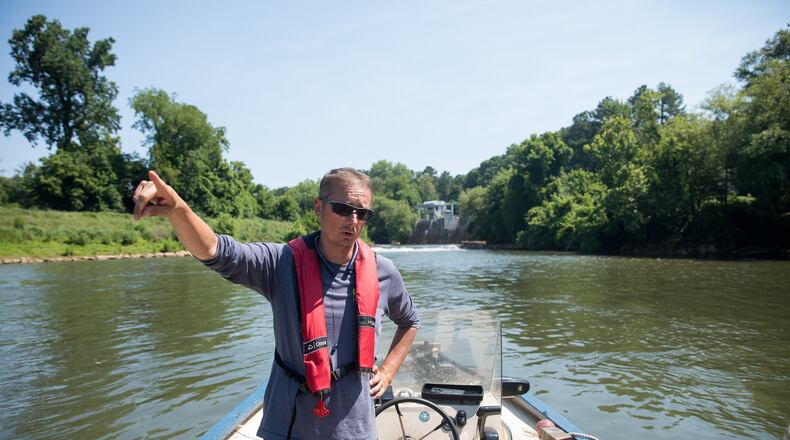The Chattahoochee Riverkeeper has told the city of Atlanta it plans to sue over discharges of poorly treated sewage into the Chattahoochee River, which the group says continue to foul the waterway with dangerous levels of bacteria and other pollutants.
The notice was sent to city leadership Monday, including Mayor Andre Dickens and Commissioner Al Wiggins, who was appointed by the mayor in May to lead the Department of Watershed Management. The Riverkeeper is represented by the Southern Environmental Law Center (SELC).
After receiving the warning of a potential lawsuit, Wiggins responded Tuesday with a letter of his own to the riverkeeper, expressing hope that the parties can resolve the situation without going to court.
The notice of intent to sue, a requirement under the federal Clean Water Act, comes weeks after the city suffered through water main breaks causing a prolonged water outage in late May and early June that captured national headlines.
The city has grappled for decades with sewer problems and is under a pair of federal consent decrees to improve its wastewater system, and now faces the possibility of having to spend billions in needed water system upgrades.
In its letter, attorneys for the SELC detail a litany of potentially dangerous discharges from Atlanta’s wastewater facilities which have entered the river nearly every month since January 2023. All three of Atlanta’s sewage treatment plants — South River and Utoy Creek, plus the city’s largest facility, the R.M. Clayton Water Reclamation Center — are implicated.
Atlanta’s state-issued permits set limits on the concentrations of certain pollutants the city is allowed to send into the river from its three wastewater facilities combined. For other water quality metrics, each individual plant has its own restrictions.
The notice filed on behalf of the riverkeeper says the city has breached its combined wastewater limits 56 times over the last 17 months by releasing higher-than-allowed levels of ammonia, phosphorus and more.
Credit: Riley Bunch/riley.bunch@ajc.com
Credit: Riley Bunch/riley.bunch@ajc.com
The R.M. Clayton plant, which is allowed to send as much as 100 million gallons of treated wastewater into the river every day, has tallied another 69 effluent violations between July 2023 and May 2024, the group’s notice says. Those include discharges of high levels of fecal bacteria, E. coli and other matter that can threaten human health and the environment.
The notice says each breach of the permits is a separate violation of the federal Clean Water Act.
The city has acknowledged the problems at R.M. Clayton and submitted plans recently to the Georgia Environmental Protection Division (EPD) to fix them. The city says it has begun taking steps to address the issues, but the city’s sewage problems appear to have continued.
As recently as June 6, the riverkeeper says its staff measured high E. coli concentrations coming from the R.M. Clayton outfall near Atlanta Road, south of Vinings. The group has recommended that people limit contact with the Chattahoochee along a 70-mile stretch between R.M. Clayton and West Point Lake, near LaGrange.
“We have serious concerns about the high levels of organic material and nutrients entering the river from the plant’s discharge, which violate the plant’s permit,” Jason Ulseth, the Chattahoochee Riverkeeper’s executive director, said in a statement.
Credit: Jason Getz / Jason.Getz@ajc.com
Credit: Jason Getz / Jason.Getz@ajc.com
The potential lawsuit is the latest in a string of concerning incidents tied to Atlanta’s water and sewage infrastructure.
In March, the city was cited by EPD for dozens of violations stemming from R.M. Clayton. No fines have been proposed for those violations, but the city was fined $163,000 in May by EPD for a separate set of 106 raw sewage spills that have occurred over the last two years.
Then, in late May and early June, a series of water main breaks left large portions of the city without drinking water for days, costing businesses and residents millions of dollars.
A Department of Watershed Management spokeswoman shared the letter that was sent Tuesday by Wiggins, the agency’s commissioner, to the Chattahoochee Riverkeeper in response to the group’s warning that it plans to sue.
In it, Wiggins wrote that the department and the riverkeeper share the same goal of clean water, but said he believes “our collective time and efforts are best spent working towards that goal, not pursuing expensive and protracted litigation.”
Wiggins added that riverkeeper staff were given a tour of the R.M. Clayton facility on June 17, but took issue with a subsequent letter sent to the department a week later, in which Wiggins said the group described the tour as “restricted.”
The Atlanta Journal-Constitution has not obtained a copy of the June 24 letter Wiggins referenced.
Credit: Riley Bunch/riley.bunch@ajc.com
Credit: Riley Bunch/riley.bunch@ajc.com
A Georgia EPD spokeswoman did not respond to a request for comment.
Though Atlanta’s wastewater issues have been the primary concern for water advocates lately, other facilities not linked to the city have also spilled huge amounts of pollution into the river.
Last year, a breakdown at Fulton County’s Big Creek Water Reclamation Facility released more than 20 million gallons of inadequately treated sewage into the river just upstream from the popular Chattahoochee National Recreation Area. The incident resulted in the closure of an 11-mile stretch of river during the busy, mid-summer season.
About the Author
Keep Reading
The Latest
Featured




